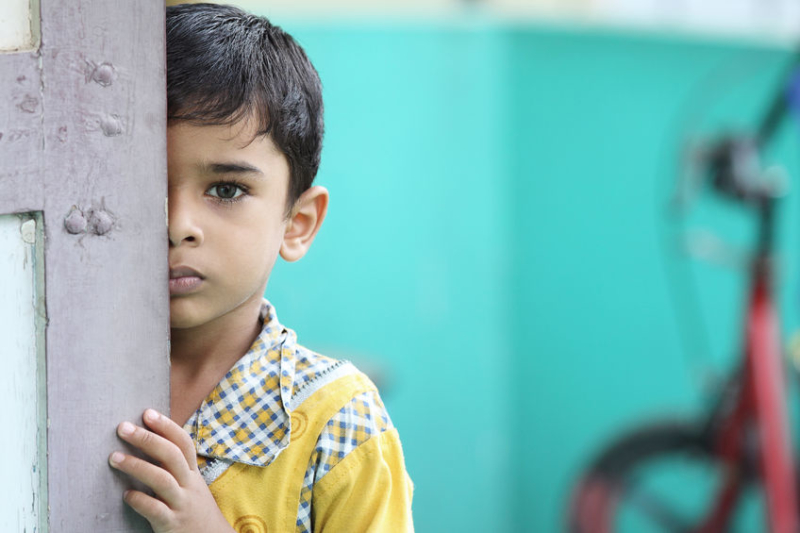Are you worried about your child who just wouldn’t open up to anyone and is very shy?
Do you worry that your child refuses to talk to people despite being spoken to and is very quiet?
Do you think that shyness, quietness, and/ or introversion are negative traits that your child may have?
Do you often pray that your introverted child will turn into an extrovert someday?
Most parents answer these questions in the affirmative. Shy, quiet, and introverted children may also show signs of being withdrawn, reclusive, intense, anti-social, and may even show signs of depression and mental illness. Introverted children may be described often using stereotypical words such as nerd, loser, and geek. Famous introverts such as Michael Jordan, Queen Elizabeth II, Charles Darwin, Albert Einstein, Warren Buffett, and Steven Spielberg show us that a lot of introverts have contributed a lot to the world and its progress and introverts needn’t be losers or outcasts as they are stereotyped. Parents of introverted children may find some solace in the fact that their child has a considerable chance of being successful as do extroverted children.
Classifying shyness/quietness/introversion as “something to panic about” would be incorrect. Children, just like adults, have personality types. To be a good parent or caregiver it is very important to understand what personality type your child belongs to and then nurture his or her talents and abilities accordingly. In this day and age of stiff competition and fewer opportunities to grab, every parent wishes his or her child is an extrovert, without really understanding the strengths that a shy or introverted child may have.
The sad part is most parents have a very negative view of shy/introverted children and often think that this trait could lead to their child being unsuccessful in their lives. They keep thinking that the child will get over this phase of life, not giving an adequate chance to their child to thrive in his or her skin and his or her true character.
Common complaints that one hears about such children are that they don’t answer or participate in the class, they don’t like to make friends and are happily playing with themselves, they like to be alone and read (to know about new things ) and they need the parents around very often.
For all the distraught parents who don’t know what will happen to their shy/ introverted children, it might be reassuring to know that they certainly have higher IQs on average. As your child grows, he or she will go through several friendly environments in life that will help them to open up a bit more. Tell your child’s teachers and school that they must deal with your child with special understanding and care, so that they grow up to love and understand themselves better.
Here are a few statements that may describe introverted children- this is just so that we can recognize this personality in children. All introverts may not exhibit all the traits or one/more of the traits in similar intensity.
- Introverts love to read.
- They have few but close and true friends; they aren’t the ones with tons on their friend lists.
- They are good at listening and dissevering information.
- They aren’t the first ones to raise their hands to answer a question at school. Their inherent nature inhibits them from contributing in class.
- They give energy to the ones they socialize with (extroverts on the other hand take energy).
- They love to be behind closed doors. They want to be in their rooms with their doors closed whenever possible.
- Social gatherings drain them. An introverted child may be more tired after school than other children.
- Introverts don’t like to be a part of group work. They like to finish their part of the puzzle on their own.
- They aren’t the ones who will learn by reading things out loud to themselves.
- They like puzzles and will insist on turning information into knowledge.
- They are very territorial.
- They like to know about expectations from any particular task well ahead of time. They are well planned.
- They suffer from a higher level of feelings of humiliation from mistakes made in public and hence will always like to be prepared in advance.
- They are intense and passionate.
- Introverts don’t like to make small talk. They aren’t the ones who will talk for long hours on the phone.
- They prefer writing to talking. It’s easier for them to share their feelings and thoughts by penning them down.
- They have a separate private and public personality.
- Introverts generally will not say things they don’t mean. They are not the ones to mince with their words.
- When an introvert talks he or she prefers to say something that is significant instead of fluff or adds on.
- They need time alone to recharge their batteries.
It’s important to understand how damaging it is for you and others to secretly expect your introverted child to turn into an extrovert. This will put unnecessary pressure both on you and your child. In the process not only will you face failure but also destroy the sense of self-worth that your child is trying to build. Do not crush your child’s personality under expectations of change but instead learn what introverts are all about and appreciate their positive traits while helping them to build a positive self-image.
Love thyself- Self-image is important
What introverts can do better than most extroverts is concentrate and focus. They can block out distractions, which makes them great listeners. As a result of this, they can remember well. Because an introverted child will focus so much on the inside, he is almost never lonely and has a fulfilling inner world.
Parents of introverted children may find it difficult sometimes to handle the shy behavior of introverted children. In many ways, an introverted child’s behavior may fox parents. They might be chatterboxes at home but when in public or social groups, they will not even respond to hello and look the other way instead.
Many of them are most content reading for hours on end rather than going out and playing and they should never be stopped from doing the same. As a matter of fact, they should be encouraged to do what they want. Always remember and explain to your child that success has nothing to do with being an introvert or an extrovert, but depends on preparation, open-mindedness, learning, personal achievement, and above all hard work.
As your child grows up, it is even more important to help them love themselves. They soon begin to realize that they are introverts and some of them might have trouble coping with this realization. When your child is old enough to understand that he or she is an introvert, sit them down and explain to them that you don’t mind them being the way they are. Tell them often enough that you love them and the world around them will love them as well. Explain to them how they are a unique person just like any other person in the world, with qualities that make them a winner.
Labeling a child as shy/ quiet or introvert
If your child doesn’t talk too much, or is shy, or prefers his or her own company, the worst thing that you can do for them is tag them with words like shy, quiet, or introvert. Many parents say, “Oh sorry my child is an introvert and doesn’t talk too much, so he or she didn’t greet you”. Never do that. Children who are shy or quiet, generally have reasons for being that way, which could be a loud or bossy sibling or fear of trying anything new etc. By tagging or labeling children you are providing them with labels to hide behind.
When you introduce your child as shy, this might further destroy his or her desire to be a part of the social set up. By tagging a child you might also be setting a standard of expectation that you have for the child.
A few ways to help your introverted child thrive and make friends :
Being an introvert is inborn-stop wishing for a change
Even though life’s experiences make some difference to the social interaction patterns of your children, introversion is a part of a child’s genetic setup. An introverted child is likely to be always a little more on the shy side since it is an inborn tendency. The first change to make is to stop clandestinely wishing that your child be the life of a party or have a billion friends because that’s not how your child would like it anyway. So stop expecting the change and focus on equipping and aiding them with skills that they will need to make a few close friends and glide through social settings.
Allow your children to charge his or her battery
Always give your introverted child some downtime. While extroverted people (both adults and children) are energized by social interaction and external stimuli, introverts are left feeling tired and drained. Too many social interactions will make an introvert feel scared and suffocated. Most of them need time alone to charge themselves and put their best foot forward before a social interaction. Hence don’t mind if your child wants to be left alone reading or listening to music behind closed doors. He or she is just preparing to go out and face the social world that way.
Aid-never push
If your kid is an introvert, never push him or her in situations that they don’t feel comfortable with. One such situation could be a birthday party. For most children, it may be okay not to have a parent around while enjoying a party, but for an introverted child, he or she constantly needs to know that his parent or caretaker is beside him or her and they have not been left alone to fend for themselves. Always be around your child till they feel comfortable with a particular bunch of people. Be willing to sit with the child on the sidelines for a while until they feel comfortable joining in.
While you make sure not to force your child in situations that they are socially uncomfortable with, also remember not to overprotect your child. Never answer on your child’s behalf. Allow your child to develop his or her social skills. By overprotecting your introverted child, you are actually stopping them from facing situations that they must learn to tackle sooner or later.
Role-play
Always speak to your child in advance about what he or she can expect in a particular social setting. Let them know in advance that there will be a certain number of people at the party. Enact social setups at home with them- especially the social interaction bit. Teach them how to approach new people when they are interested in joining in a game or making friends with someone. These enactments will help your child prep before-hand about what to expect and how to behave when he or she is faced with a situation.
Physical proximity
Always be close to your child physically when they are in a new environment, till they get comfortable in the new environment. Hold their hand or pick them up when they meet new people. This will keep them assured. Never scold them in public for not saying hello or good morning. This will only put them off meeting people. Instead behave the way you would expect them to socially, making sure your child is always close to you physically, so they can pick up lessons pertaining to social talk and interactions from you. Allow your child to wonder if he or she wishes to.
Despite you being close to your child, he or she may not be willing to go ahead and interact with people. You must note that some children may just have a cautious streak. They may like to assess a situation, weigh it well and then decide if they want to get involved in it. Do not push -let them take their time.
Build their confidence in social settings
Besides being very careful not to discourage or scream at your child for their lack of social skills, you must always try to let them be the boss in social settings. Allow your introverted child to pay vendors or collect bags from the grocery store. Also, encourage them to order their own meal while at a restaurant or tell the storekeeper what exactly they are looking for at a store. This will help them to gain confidence in public settings.
As you allow your child to take charge in social settings, you are actually allowing them to develop a feeling of pride and security, which will help them blossom in life. This way by not pushing your child but encouraging them instead, you are making them feel accepted and worthy as an individual, and at the same time allowing them to take charge.
Don’t speak on their behalf
Never make the mistake of speaking for your introverted child. Give him or her time to build their thoughts and find their own way of expressing them. One of the most common mistakes that parents of introverted children make is to speak on their behalf. This does not allow the child to find his or her own voice. Positive encouragement
Always appreciate the effort your child is making in interacting with people. Be specific in your praise so that they know what they did right. This will allow them to know which part of behavior they must repeat. Realize that some days will be better than others, depending on your child’s mood and energy level. One friend at a time
Always help your child to interact in small groups. Let your child make one friend at a time instead of having him or her face a big bunch. For example, if you have just moved home, invite one friend at a time to your house for a few days till your child is comfortable with this one friend. You can then call another one, till the child opens up to him or her as well. After repeated single play dates you may want to get 2 or 3 kids over together, with who your child has already interacted one on one.
Activities that shy/introverted children may like
If the introverted child doesn’t like to participate in group activities, do not fret. If you worry about how your child will spend time constructively, then think of things that can be done alone, minus groups. Instead of pushing your introverted child to clubs and groups, what you could do is encourage them to do some of the things below:
- Swimming, athletics, long-distance running, or any other individual-based sports. Your child will love you for giving him or her space and chances are that they will excel in it.
- Collecting stamps or coins of foreign currencies. Help them to study the various collectibles. Ask friends and relatives in various countries to get some for your child. This way you are helping them to get a higher self-image while they do something constructive.
- Photography or writing is another thing that introverted children will excel in since it requires focus, concentration, and understanding all of which your child has loads of.
- Constructive Internet browsing and Internet projects is another way for them to learn and keep themselves busy.
Pets and gardening could be another activity that you should consider for your introverted child as this doesn’t require too much social interaction yet can be very fulfilling and give them a sense of company.
Click here for Case Study on Shy /Quiet / Introvert Children
Top Questions on Shy/Quiet/Introvert Children
- My child is very shy and doesn’t answer people when they talk to her-she hides behind me instead. What can I do?
- My child is very shy and doesn’t take part in any activities. How can I help?
- My son is seven years old and he doesn’t participate in the class even when he knows the answers to the questions being asked. How should I handle him?
- I have a 10-year-old son. He shuts the door of her bedroom when we have guests at home? These are very embarrassing situations for me. Please help!
- My 14 year old daughter was always a shy child but now she has turned into a complete introvert. She doesn’t talk much and has very few friends.
- How can I try to turn my daughter into an extrovert and make her talk and speak?
- I am worried that my child will lose out in life because she doesn’t talk much. What should I do?








